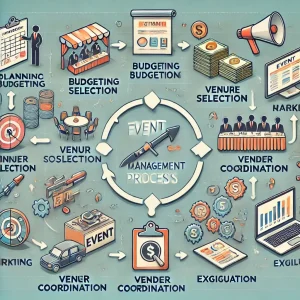Top 7 stages of event planning
What Are Top 7 stages of event planning
The top 7 stages of event planning are outlined below:
- strategic planning
- team formation
- budgeting
- venue selection
- event planning
- promotion
- execution
We will delve into a detailed analysis of each of the seven topics listed above.

Strategic planning for events
This phase involves defining the goals and objectives of the event in alignment with the company’s business strategies, ensuring the right audience is targeted for the event. This includes establishing the necessary budget, selecting the venue, and aiming for a successful event.
The five steps of strategic planning are as follows:
- Analyzing the company’s status – this involves evaluating the organization’s budget and environment.
- Future vision – creating a vision for the potential advantages and disadvantages that may arise during the event.
- Setting goals – recognizing the company’s objectives and aims for the event.
- Strategies and planning – formulating a strategy can minimize conflicts, enabling the event to proceed smoothly with fewer errors. This can contribute to a successful outcome.
- Implementation – carrying out the plans discussed and adhering to the strategies the team agreed upon prior to the event.
By following these five steps in strategic planning, an event team can successfully execute an event.

Team formation
This involves assembling a group of members with diverse skills, which facilitates a successful event by effectively applying their abilities in the correct manner and direction.
How to create an event management team
To establish an event management team, it is essential to have members with varied skills and clear lines of communication. An event planner should seek individuals with expertise in hospitality, logistics, planning, or marketing.
An organized team for an event should include the following key roles:
– Event Manager / Team Lead – Responsible for overseeing the entire event, planning logistics, and guiding the team.
– Client Relations Manager – Engages with clients to comprehend their needs and expectations.
– Logistics Coordinator – Handles venue selection, permits, transportation, and equipment.
– Marketing & PR Specialist – Promotes the event, manages social media initiatives, and collaborates with media partners.
– Sponsorship & Finance Manager – Manages budgets, secures sponsorships, and processes vendor payments.
– Creative Director / Designer – Designs event themes, décor, and branding elements.
– Technical & Production Team – Oversees sound, lighting, and audio-visual needs.
– Volunteers & On-Site Staff – Aids in execution, guest management, and problem-solving during the event.

Budgeting
In the context of the Top 7 stages of event planning event management, budgeting refers to the process of developing and managing financial plans for a specific occasion.
Budgeting is vital for determining the financial viability of an event, guiding expenditure decisions, and assessing outcomes post-event. It serves as an effective tool to ensure adherence to financial limitations.
Why is budgeting essential?
- A meticulously planned budget facilitates the calculation and tracking of expenditures, preventing overspending and maintaining financial constraints.
- It aids in the allocation of funds across various critical areas such as catering, marketing, and entertainment.
- Budgeting helps to avert unexpected financial crises. A well-structured budget can either prevent or assist in managing such emergencies.
- Budgeting supports the analysis of profit-loss and overall financial success.

Venue selection
Venue selection pertains to the process of identifying the location for the event based on factors such as size, capacity, and the organizer’s budget.
1. Identify Event Requirements
Determine the nature of the event (corporate, wedding, concert, etc.). Estimate the attendee count. Recognize required amenities (AV gear, Wi-Fi, catering, etc.).
- Establish a Budget
Designate a specific budget for the venue. Compare venue prices, including any hidden fees (security, parking, cleaning, etc.). Explore package options that encompass catering and decoration.
- Evaluate Location & Accessibility
Select a venue that is convenient for attendees to access. Confirm the availability of public transport and parking options. If participants are coming in from out of town, research nearby accommodations.
- Review Venue Capacity & Layout
Verify that the venue can comfortably hold your anticipated guests. Ensure the layout suits your event configuration (stage, dance floor, seating arrangement).
Search for adaptable spaces that can meet your requirements.
- Inspect Facilities & Services
Confirm the availability of sound systems, lighting, restrooms, and catering services. Check if the venue has event staff, security, or technical assistance. Ensure safety provisions like fire exits and accessibility for differently-abled guests are in place.
- Confirm Availability & References
Check if the venue is open on your chosen event date. Look at online reviews or request referrals from former clients. Visit the venue to assess cleanliness, atmosphere, and overall appropriateness.

Event Planning
It offers benefits such as maximizing resource utilization while reducing stress through proactive management of details, enhancing attendee experiences through careful design, optimizing expenses through diligent budgeting, improving brand perception with outstanding events, showcasing adaptability in response to changing needs, and creating memorable experiences through creativity and smooth coordination across all aspects of the event.

Promotion
In the field of event management, the concept of “promotion” is crucial for the success of any gathering. It includes a range of marketing and communication tactics aimed at increasing visibility and generating interest in an event. This process is primarily about attracting attendees, sponsors, and stakeholders by effectively communicating key event information. By leveraging various platforms such as social media, email marketing campaigns, effective public relations, and targeted advertisements, promoters generate excitement that resonates with their intended audience. Successful promotion resembles effectively marketing an event; it demands an understanding of the audience’s preferences and behaviors. Ultimately, the objective is to inspire individuals to engage with the event, which not only drives attendance but also nurtures a community feeling around it. Dedication of time and resources to well-thought-out promotional strategies is essential for creating a memorable and influential event.

Execution
Effective execution is a thorough process that calls for careful management and strategic coordination among the team members. It commences with a detailed setup, which establishes a strong groundwork for success. As you assemble the team, it’s vital to promote a collaborative atmosphere and open communication. This ensures every team member comprehends their responsibilities. This highlights the importance of thorough preparation. Having contingency strategies and a proactive attitude enables you to adjust to unexpected challenges and resolve issues. Essentially, effective execution involves a combination of strong leadership, teamwork, and the capability to handle etc.




